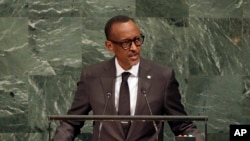The family of a former Rwandan presidential candidate is demanding answers a week after she was taken into police custody.
Officially, Diane Rwigara has been charged with “offenses against state security and forgery” following her arrest on Sept. 23. Her family believes the only crime she committed was challenging the authority of President Paul Kagame by running for president.
“These charges are false; they are totally false, and nobody in Rwanda believes the validity of these charges. Everybody knows it’s all made up,” said Rwigara’s brother Aristide Rwigara, who lives in the United States and spoke to VOA.
“It’s punishment to my sister because she was running for president. You don’t do that in Rwanda. You don’t exercise your constitutional rights.”
Moved to jail cell
Aristide Rwigara said his sisters Diane and Anne, and his mother Adeline, were initially under house arrest and regularly brought into a police station for questioning during early morning hours. In recent days, they’ve been held in a jail cell, he said.
Human rights groups have accused President Kagame’s party of harassing opponents and using intimidation to stifle any dissent to his rule. Kagame has led Rwanda since 2000 and was re-elected to a third term in August. The official results showed him winning nearly 99 percent of the vote.
Silencing critics?
Diane Rwigara is a women’s rights activist and vocal critic of Kagame. After she announced her candidacy in May, nude photos of her, which she dismissed as fake, circulated online. Later, she was disqualified from appearing on the ballot due to an alleged lack of signatures and has been arrested twice.
This is not her family’s first run-in with the Rwandan Patriotic Front, Rwanda’s ruling party. In 2015, her father, Assinapol, died in a car accident. The family believes he was assassinated, possibly by business rivals. His family unsuccessfully petitioned Kagame to investigate the case, citing his large donations to the ruling party.
Aristide Rwigara says his sister’s arrest sends a message to all people in Rwanda who might want to criticize the government.
“It’s an act of silencing critics. It’s a way of making sure that the truth doesn’t get out,” he said. “My sister (is) very outspoken telling the truth about what's actually going on in Rwanda and tearing apart this false image of this prosperous — this utopian image of Rwanda they are selling, (which) is absolutely false.”
‘Serve my people the best way they can be served'
When confronted with criticism of his human rights record during a speech at the Council on Foreign Relations in New York last month, Kagame denied any wrongdoing.
“It's cynical and absurd that anyone would just be there talking about violations,” he said. “You know, me as the leader of my own people, to be accused of violating their rights is just an absurd insult. But my answer is simple — is to do my best to serve my people the best way they can be served.”
Anjan Sundaram, a journalist who has spent years covering Africa's Great Lakes region and has written a book titled Bad News: Last Journalists in a Dictatorship, about reporters in Rwanda, said that human rights and civil liberties have been steadily eroding under Kagame’s rule.
“His hold on power has tightened over the last 25 years,” Sundaram told VOA. “We’ve seen decreasing political space, decreasing space for a free press and the increasing concentration of power in the presidential office headed by Kagame.”
Signs of trouble ahead
Although Kagame won international acclaim for his efforts to promote reconciliation and heal the wounds of Rwanda's 1994 genocide, his authoritarian actions in recent years have left him increasingly isolated.
“Initially, when Kagame took power in 1994, just after Rwanda’s genocide, a lot of observers were willing to make allowances for Kagame’s authoritarian style of leadership believing that it was justified in the aftermath of a genocide. And there may have been truth to that,” Sundaram said.
“Twenty-four years since the genocide, now observers are seeing fewer and fewer justifications for such authoritarian leadership and worrying signs that any transition of power from Kagame in Rwanda will be accompanied by violence.”
Under recent constitutional reforms, Kagame is eligible to run for two additional five-year terms as president after his current seven-year term ends. That means the Rwandan leader, who turns 60 this month, could stay in office until 2034.









